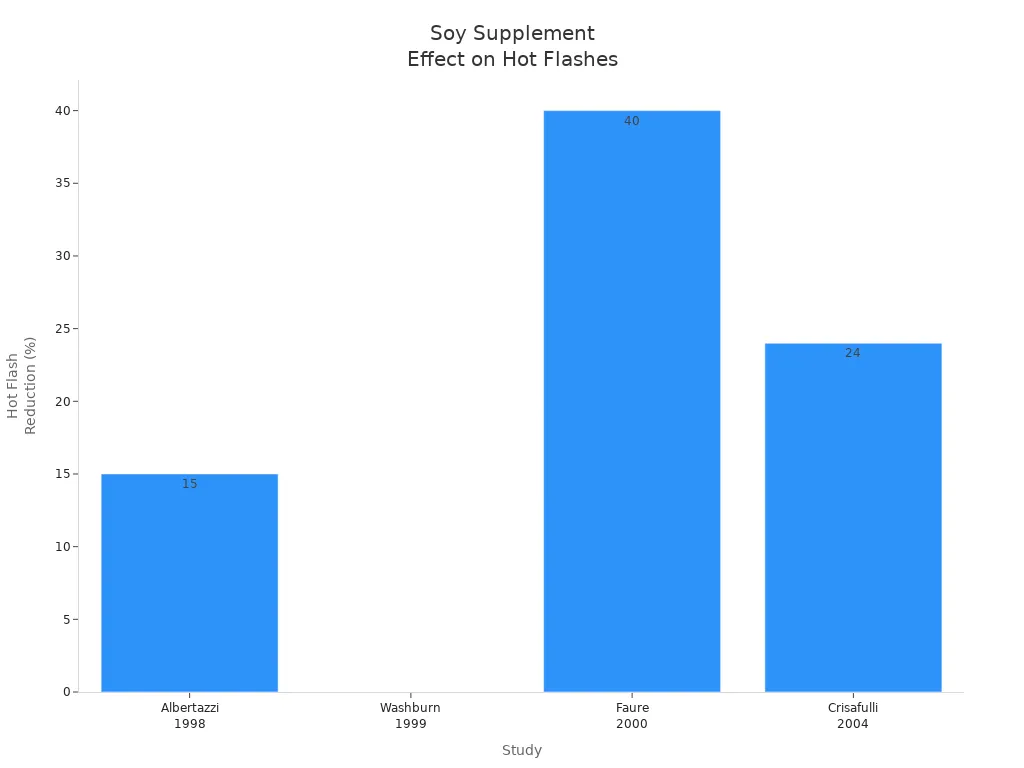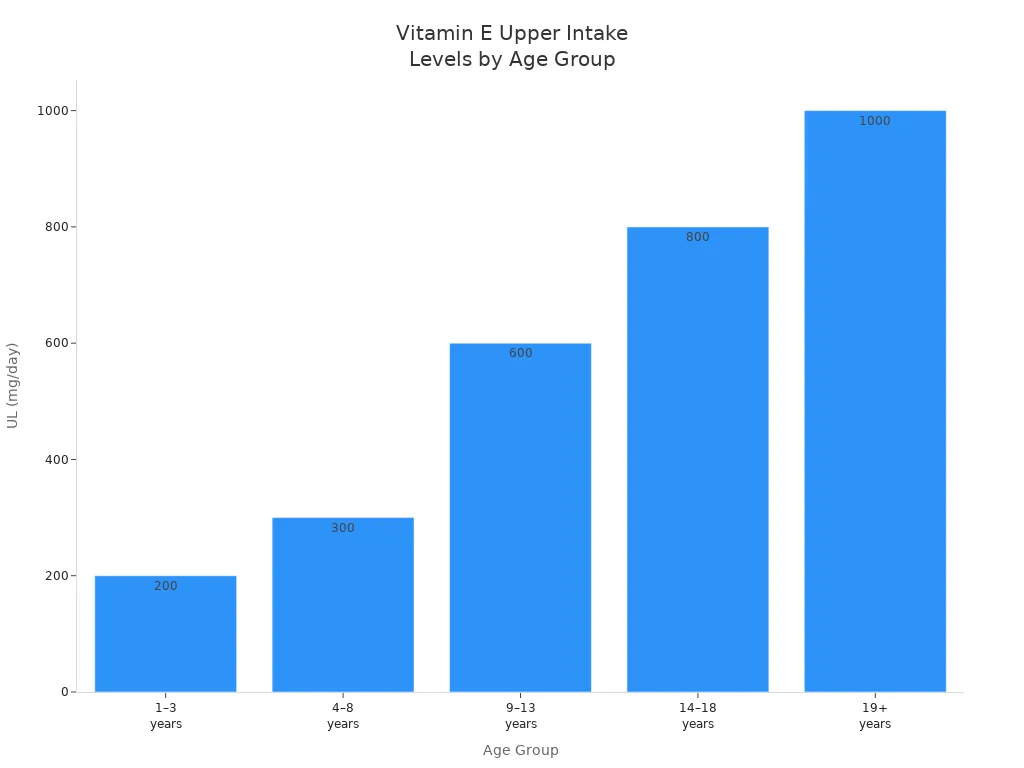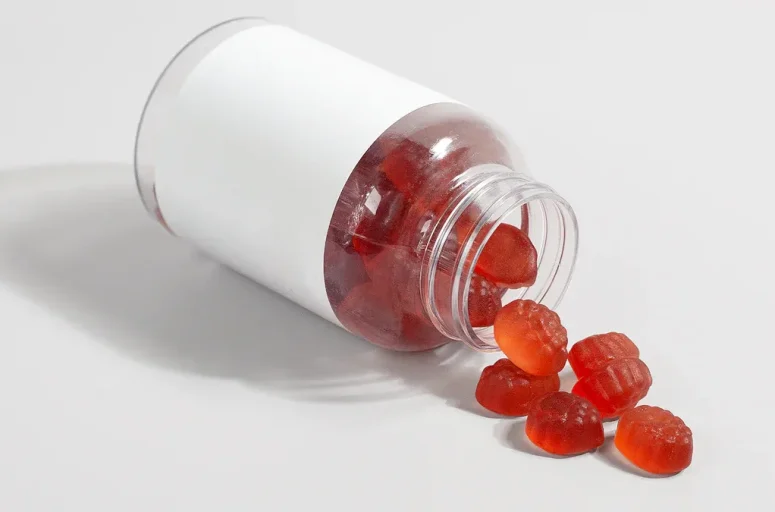
Looking for the best supplements to ease perimenopause symptoms like sleep problems and hot flashes? Many women find relief with magnesium, melatonin, black cohosh, phytoestrogens (such as soy isoflavones), flaxseed, ashwagandha, and vitamin E. These options support sleep, mood, and menopause comfort. Clinical studies show soy isoflavones can reduce hot flashes by up to 40% compared to placebo.

Always talk to your healthcare provider before starting any supplement. You deserve support as you manage menopause and improve your sleep.
Key Takeaways
Magnesium and melatonin are top supplements to improve sleep quality and reduce insomnia during perimenopause.
Soy isoflavones and flaxseed help lower hot flashes and night sweats by supporting hormone balance naturally.
Ashwagandha, L-theanine, and b vitamins reduce stress and improve mood, easing menopause fatigue and anxiety.
Black cohosh may help some women with hot flashes but has mixed research results and possible side effects.
Always start supplements at low doses, watch for side effects, and consult your healthcare provider before use.
Good sleep habits and lifestyle changes, like dressing in layers and avoiding triggers, boost supplement benefits.
Track your symptoms and progress to find the best supplement routine tailored to your unique needs.
Supplements support perimenopause relief but do not replace medical advice or treatments from your doctor.
Best Supplements for Perimenopause
Magnesium
Sleep Support
Magnesium stands out as one of the best supplements for perimenopause, especially if you struggle with sleep. You may notice that higher magnesium levels often link to better sleep quality, longer sleep duration, and less fatigue. Magnesium helps your body relax by increasing GABA in your brain, which calms your central nervous system. This process can make it easier for you to fall asleep and stay asleep. Many women with perimenopause experience insomnia or frequent sleep disturbances. Magnesium glycinate is a preferred form because your body absorbs it well and it rarely causes stomach upset. You can combine magnesium with good sleep habits, such as keeping a regular bedtime and making your bedroom cool and dark, to improve sleep quality.
Magnesium may help:
Ease anxiety before bed
Relax your muscles
Reduce stress that keeps you awake
Hot Flash Relief
Some women also use magnesium to manage hot flashes during perimenopause. While hormone therapy remains the most effective treatment for hot flashes, magnesium offers a natural option for those who cannot or do not want to use hormones. You should aim for a daily intake of 320 to 360 mg if you are under 50, and at least 320 mg if you are over 51. Keep your total magnesium intake below 600 mg per day to avoid side effects like diarrhea or stomach discomfort. Magnesium citrate and oxide forms may cause more digestive issues, so magnesium glycinate is usually safer. If you have kidney problems or other health conditions, talk to your healthcare provider before starting magnesium.
Tip: Start with a low dose and increase slowly to see how your body reacts. If you notice any digestive upset, lower your dose or try a different form.
Melatonin
Sleep Quality
Melatonin is one of the best supplements and is often called the best sleep supplement for perimenopause. Your body naturally produces melatonin to regulate your sleep-wake cycle. As you approach perimenopause, your melatonin levels may drop, leading to sleep disturbances and insomnia. Taking melatonin supplements can help you fall asleep faster and improve sleep quality. Many women find that melatonin helps them stay asleep through the night, even if they wake up due to hot flashes or night sweats.
You can take melatonin about 30 minutes before bedtime. Most people start with a low dose, such as 0.5 to 3 mg, and adjust as needed. Melatonin rarely causes side effects, but some people may feel groggy in the morning or have vivid dreams. You should avoid driving or operating machinery if you feel drowsy after taking melatonin. Melatonin supplements do not interact with most medications, but you should still check with your doctor if you take other sleep aids or antidepressants.
Melatonin may help you:
Fall asleep faster
Stay asleep longer
Reset your sleep patterns if you travel or work night shifts
Black Cohosh
Hot Flashes
Black cohosh is a popular herbal supplement for hot flushes and is often included in lists of the best supplements for perimenopause. Many women try black cohosh to reduce hot flashes and night sweats. However, research on black cohosh shows mixed results. Some studies report no significant reduction in hot flashes compared to placebo, while others suggest mild benefits. The table below summarizes key findings from recent research:
Study/Source | Type of Evidence | Key Findings |
|---|---|---|
2016 Systematic Review and Meta-analysis | Systematic review/meta-analysis of 4 RCTs (511 women) | No significant reduction in hot flashes with black cohosh vs placebo |
American College of Obstetricians and Gynecologists (2015) | Clinical guidelines | Do not recommend black cohosh for hot flashes due to lack of efficacy evidence |
North American Menopause Society | Expert opinion/guidelines | Advises against recommending black cohosh for hot flashes |
2024 Journal of Mid-life Health Meta-analysis | Meta-analysis of 4 RCTs | 3 of 4 trials found black cohosh helpful for menopausal symptoms, especially hot flashes and night sweats |
You may find black cohosh in many herbal supplements for hot flushes, but leading medical organizations do not recommend it as a first-line treatment for hot flashes. If you choose to try black cohosh, monitor your symptoms and discuss your progress with your healthcare provider.
Sleep Efficiency
Some women use black cohosh to improve sleep efficiency during perimenopause. Black cohosh may act on serotonergic pathways in your brain, which could help with mood and sleep. However, studies do not show consistent benefits for sleep disturbances or insomnia. You may experience mild side effects, such as stomach upset, headache, or rash. Rarely, black cohosh can cause liver problems. Watch for symptoms like dark urine or unusual fatigue, and stop taking black cohosh if these occur.
Avoid black cohosh if you:
Are pregnant or breastfeeding
Have a history of breast cancer or hormone-sensitive conditions
Have liver disease
Note: Black cohosh may interact with certain medications, including some cancer treatments, drugs processed by the liver, and estrogen therapies. Always consult your healthcare provider before starting black cohosh.
Medical Disclaimer:
This blog provides general information for educational purposes only. It does not replace professional medical advice, diagnosis, or treatment. Always consult your healthcare provider before starting any new supplement, especially if you have underlying health conditions or take prescription medications.
Phytoestrogens
Phytoestrogens are plant-based compounds that act like weak estrogens in your body. You can find them in foods such as soybeans, chickpeas, lentils, and red clover. Many women use phytoestrogens to help manage perimenopausal symptoms, especially hot flashes and night sweats.
Soy Isoflavones
Soy isoflavones are among the most studied phytoestrogens for perimenopause. These compounds mimic estrogen and may help balance hormone levels when your natural estrogen drops. You can get soy isoflavones from foods like tofu, tempeh, and soy milk, or from supplements.
Meta-analyses and systematic reviews of randomized controlled trials show that soy isoflavones can significantly reduce the frequency of hot flashes in perimenopausal and postmenopausal women compared to placebo. Some studies even suggest that soy isoflavones work as well as hormone replacement therapy for hot flashes, though hormone therapy may help more with other symptoms. Most women tolerate soy isoflavones well and do not experience serious side effects.
You should know that soy isoflavones do not seem to improve the overall Kupperman index, which measures a wide range of menopausal symptoms. The benefits focus mainly on hot flashes and night sweats. Dosages in studies usually range from 40 to 80 mg per day. If you have a history of hormone-sensitive cancers, talk to your doctor before using soy supplements.
Red Clover
Red clover is another source of phytoestrogens. You can find it in teas, capsules, and extracts. Like soy, red clover contains isoflavones that may help reduce hot flashes and night sweats. Clinical trials, including the Isoflavone Clover Extract (ICE) Study, found that red clover supplements can lower the frequency of hot flashes in perimenopausal women.
Red clover is generally safe for most people. You may experience mild side effects such as headache or nausea. The typical dose ranges from 40 to 80 mg of isoflavones daily. If you take blood thinners or have a history of hormone-sensitive conditions, consult your healthcare provider before starting red clover.
Tip: If you want to try phytoestrogens, start with dietary sources like soy foods before moving to supplements.
Flaxseed
Flaxseed is a rich source of lignans, which are phytoestrogens with weak estrogen-like effects. You can add ground flaxseed to smoothies, yogurt, or oatmeal for an easy boost.
Hormone Balance
Flaxseed may help balance hormones during perimenopause. In a clinical trial with 145 perimenopausal women, those who took 10 grams of flaxseed powder daily for three months saw significant improvements in menopausal symptoms. Researchers measured hormone-related markers and found that flaxseed increased levels of enterodiol and enterolactone, two compounds linked to estrogen activity. Women in the flaxseed group reported a 47% drop in symptom scores on the Kupperman index and a 54% reduction on the Menopause Rating Scale.
Night Sweats
Night sweats can disrupt your sleep and lower your quality of life. The same clinical trial showed that flaxseed supplementation led to a notable reduction in vasomotor symptoms, including night sweats and hot flashes. Women taking flaxseed reported about a 50% improvement in their menopause-specific quality of life scores. Flaxseed offers a natural option for easing night sweats and may serve as an alternative to hormone therapy with fewer side effects.
You should start with 1-2 tablespoons of ground flaxseed daily. Drink plenty of water to avoid digestive discomfort. If you take blood thinners or have bowel problems, check with your doctor before adding flaxseed to your diet.
Ashwagandha
Ashwagandha is an adaptogenic herb used in traditional medicine to help your body cope with stress. Many women use ashwagandha to manage perimenopausal symptoms such as anxiety, mood swings, and sleep problems.
Stress Relief
Randomized controlled trials show that ashwagandha supplementation can lower stress and anxiety scores on validated scales. You may notice reduced morning cortisol levels, which is the hormone your body releases in response to stress. Ashwagandha works by modulating the hypothalamic–pituitary–adrenal (HPA) axis, which helps regulate your stress response. Participants in these studies often report better psychological well-being, more energy, and improved mental clarity.
Sleep Aid
Sleep problems are common during perimenopause. Clinical trials and a 2021 meta-analysis found that ashwagandha can improve sleep quality, sleep efficiency, and total sleep time, especially in people with insomnia. Doses of 600 mg per day for at least eight weeks produced the best results. You may fall asleep faster and wake up feeling more rested. Ashwagandha appears well tolerated for up to three months, but long-term safety is not known.
Safety Consideration / Interaction | Description |
|---|---|
Ashwagandha may increase thyroid hormone levels. Use caution if you have thyroid disorders or take thyroid medications. | |
Autoimmune Diseases | Ashwagandha can stimulate the immune system. Avoid if you have autoimmune conditions. |
Liver Disease | Rare cases of liver injury have been reported. Avoid if you have liver disease or take hepatotoxic drugs. |
Pregnancy and Breastfeeding | Do not use ashwagandha during pregnancy or breastfeeding. |
Sedative Medications | Ashwagandha may cause drowsiness. Combining with sedatives can increase this effect. |
Immunosuppressants | Ashwagandha may reduce the effectiveness of immunosuppressive drugs. |
Antidiabetes and Antihypertensive Drugs | Ashwagandha can lower blood sugar and blood pressure. Monitor closely if you take these medications. |
Surgery | Stop ashwagandha at least two weeks before surgery. |
Medical Disclaimer:
This blog provides general information for educational purposes only. It does not replace professional medical advice, diagnosis, or treatment. Always consult your healthcare provider before starting any new supplement, especially if you have underlying health conditions or take prescription medications.
Valerian Root
Sleep Onset
You may struggle to fall asleep during perimenopause. Valerian root offers a natural option for improving sleep onset. This herbal supplement has a long history of use for insomnia and sleep disturbances. Clinical research supports its effectiveness. In a randomized, triple-blind, placebo-controlled trial, 100 postmenopausal women with insomnia took 530 mg of concentrated valerian root extract twice daily for four weeks. The results showed a statistically significant improvement in sleep quality compared to placebo. About 30% of women in the valerian group reported better sleep onset, while only 4% in the placebo group saw improvement. Although the study focused on postmenopausal women, the findings apply to perimenopausal sleep problems because hormonal changes affect sleep patterns in both groups.
Valerian root may help you fall asleep faster by increasing levels of GABA, a neurotransmitter that calms your brain. You can use valerian root as a tea, capsule, or extract. Most people start with 300 to 600 mg about one hour before bedtime. You should avoid driving or operating machinery after taking valerian root, as it may cause drowsiness.
Sleep Quality
Valerian root not only helps with sleep onset but also improves overall sleep quality. You may notice deeper, more restful sleep and fewer nighttime awakenings. The same clinical trial found that valerian root led to significant improvements in sleep quality for women experiencing menopause-related sleep disturbances. You may benefit from valerian root if you have trouble staying asleep or wake up feeling tired.
Valerian root is generally well tolerated. Common side effects include:
Dizziness
Drowsiness
Headache
Stomach upset
Mental dullness
Vivid dreams
If you use valerian root for several weeks, you should taper the dose gradually to avoid withdrawal symptoms. You should consult your healthcare provider before starting valerian root, especially if you take other sedatives or have liver problems.
Tip: Try valerian root for a few weeks to see if your sleep improves. If you notice side effects, lower your dose or switch to another supplement.
L-Theanine
Calming Effects
L-theanine is an amino acid found in green tea. You may use L-theanine to support relaxation and improve sleep during perimenopause. Scientific studies show that L-theanine increases neurotransmitters such as GABA, serotonin, and dopamine. These chemicals help regulate mood and sleep. A 2023 study found that L-theanine was especially effective for perimenopausal women. You may find it easier to fall asleep, stay asleep throughout the night, and enjoy longer total sleep duration.
L-theanine works by calming your mind and reducing stress. You may notice less anxiety and fewer racing thoughts at bedtime. Most people take 200 to 400 mg daily for stress relief and sleep support. The US FDA recommends a maximum daily intake of 1200 mg. L-theanine is well tolerated and rarely causes side effects. You may use L-theanine alone or combine it with melatonin for better results.
You should know that research on L-theanine in perimenopausal women is still limited. However, studies in postmenopausal women and general populations suggest similar benefits. L-theanine may help you manage sleep disturbances and stress during perimenopause.
Note: If you take medications for anxiety or depression, talk to your doctor before using L-theanine.
5-HTP
Relaxation
5-HTP (5-hydroxytryptophan) is a supplement that your body converts into serotonin and melatonin. These chemicals play a key role in regulating sleep and relaxation. You may benefit from 5-HTP if you experience mood swings, anxiety, or sleep problems during perimenopause. A 12-week randomized controlled trial in older adults showed that 100 mg of 5-HTP daily improved sleep quality, especially in poor sleepers. Participants reported better global sleep scores and higher serotonin levels. 5-HTP also increased gut microbiota diversity, which may support healthy sleep.
You may find that 5-HTP helps you relax before bed and fall asleep more easily. The supplement supports melatonin production, which is important for maintaining a healthy sleep-wake cycle. You can use 5-HTP alone or with other sleep supplements.
Sleep Patterns
Hormonal changes during perimenopause can disrupt your sleep patterns. 5-HTP may help restore balance by boosting serotonin and melatonin levels. You may notice fewer nighttime awakenings and more consistent sleep. Most people take 100 to 400 mg daily for sleep support. You should avoid very large doses, as these can cause serious side effects.
Aspect | Details |
|---|---|
Potential Risks | Large doses (6-10 grams daily) linked to severe stomach problems and muscle spasms. |
Possible development of eosinophilia-myalgia syndrome (EMS), though causation is uncertain. | |
Common Side Effects | Heartburn, stomach pain, nausea, vomiting, diarrhea, drowsiness, sexual problems, muscle problems. |
Precautions | Use cautiously due to uncertain EMS risk; avoid during pregnancy and breastfeeding due to insufficient data. |
Stop 5-HTP at least 2 weeks before surgery to avoid serotonin-related complications. | |
Drug Interactions | Carbidopa: increased risk of rapid speech, anxiety, aggressiveness. |
Sedatives: increased risk of excessive sleepiness and slowed breathing. | |
Serotonergic drugs: risk of serotonin syndrome causing heart problems, seizures, vomiting. | |
Dosing Guidance | Possibly safe up to 400 mg daily for up to one year; very large doses should be avoided. |
Relevance to Perimenopause | Although not specifically studied in perimenopausal individuals, these risks and interactions apply, especially as 5-HTP is sometimes considered for menopausal symptom relief (e.g., hot flashes). |
You should consult your healthcare provider before starting 5-HTP, especially if you take medications that affect serotonin or melatonin. Always start with a low dose and monitor your response.
Medical Disclaimer:
This blog provides general information for educational purposes only. It does not replace professional medical advice, diagnosis, or treatment. Always consult your healthcare provider before starting any new supplement, especially if you have underlying health conditions or take prescription medications.
Probiotics
Symptom Relief
You may not think of probiotics as a supplement for perimenopause, but they can play a helpful role in managing symptoms. Probiotics are live bacteria that support your gut health. During perimenopause, your hormone levels change, which can affect your gut microbiome. A healthy gut can help balance hormones and reduce discomfort.
Recent research shows that certain probiotic strains have estrogen-like activity. In studies using animal models that mimic menopause, probiotics helped protect against symptoms such as hot flashes, metabolic changes, mood swings, and bone loss. These probiotics increased estrogen receptor activity in tissues without causing unwanted effects on the uterus. This means they may offer some of the benefits of estrogen without the risks of hormone therapy.
Clinical studies in women also show promise. For example, women who took Lactobacillus acidophilus YT1 reported fewer menopause symptoms, including less severe hot flashes and night sweats. Their overall symptom scores improved, and they did not experience major side effects. Probiotics may help you by modulating estrogen metabolism and supporting a healthy gut, which can ease both hot flashes and night sweats.
You can find probiotics in yogurt, kefir, and fermented foods, or as supplements. Look for products with well-studied strains like Lactobacillus and Bifidobacterium. Most people tolerate probiotics well, but you should talk to your healthcare provider if you have immune system problems or take medications that affect your gut.
Tip: Try adding probiotic-rich foods to your diet before starting supplements. This can gently support your gut and help you notice changes in your symptoms.
Liquorice Extract
Hot Flash Reduction
Liquorice extract is another supplement you might consider for perimenopausal symptoms. Liquorice root contains compounds that act like selective estrogen receptor modulators (SERMs). These compounds, such as liquiritigenin, can activate certain estrogen receptors in your body. This selective action may help reduce hot flashes without increasing the risk of hormone-sensitive cancers.
Some studies show that women who take liquorice supplements experience fewer or shorter hot flashes. The compounds in liquorice root can stimulate estrogen-regulated genes, which may help improve hot flashes and night sweats. However, the effects are complex. Some components in liquorice may also reduce estrogen production, so the benefits can vary from person to person. The estrogen-like effects of liquorice are much weaker than those of prescription hormones, and research results are mixed.
You should be aware of safety concerns with liquorice extract. Even small amounts can cause serious side effects in some people. These include:
High blood pressure (hypertension)
Low potassium levels (hypokalemia)
Muscle weakness or paralysis
Water retention
Heart rhythm problems
Some people have developed severe symptoms after taking only small doses. Because of these risks, you must consult your healthcare provider before starting liquorice extract. There is no clear recommended dosage, so medical guidance is essential.
Note: If you have high blood pressure, heart disease, or kidney problems, avoid liquorice supplements. Always check with your doctor before trying new herbal remedies.
Vitamin E
Mild Hot Flashes
Vitamin E is a well-known antioxidant that may help with mild hot flashes during perimenopause. Some women find that vitamin E supplements reduce the frequency and severity of hot flashes and night sweats. Researchers believe vitamin E may work by protecting cells from oxidative stress, which increases during hormonal changes.
You should know the recommended upper intake levels for vitamin E. Taking too much can cause health problems, especially if you use blood thinners or have certain medical conditions. The table below shows the safe upper limits by age group:
Age Group | UL (mg/day) | Notes |
|---|---|---|
1–3 years | 200 mg | |
4–8 years | 300 mg | |
9–13 years | 600 mg | |
14–18 years | 800 mg | Includes pregnancy and lactation |
19+ years | 1,000 mg | Includes pregnancy and lactation |

Most adults should not exceed 1,000 mg per day from supplements. High doses can increase the risk of bleeding, especially if you take blood thinners like warfarin. Some studies link doses above 400 IU per day to a higher risk of health problems, including bleeding and, in men, prostate cancer. Vitamin E deficiency is rare, but people with certain digestive or genetic conditions may need supplements.
Medical Disclaimer:
This blog provides general information for educational purposes only. It does not replace professional medical advice, diagnosis, or treatment. Always consult your healthcare provider before starting any new supplement, especially if you have underlying health conditions or take prescription medications.
Curcumin
Brain Fog
You may notice that brain fog becomes more common during perimenopause. This can include trouble with memory, focus, and mental clarity. Curcumin, the main active compound in turmeric, has gained attention for its potential to support cognitive health. Researchers believe curcumin works because it has strong anti-inflammatory and antioxidant properties. These effects may help protect your brain from the stress and inflammation that can worsen brain fog.
Clinical trials in older adults found that daily curcumin supplements (90 mg twice daily or 500 mg per day) improved memory, attention, and mood over several months.
A systematic review showed that curcumin can enhance both verbal and visual memory, boost attention, and reduce harmful proteins in the brain linked to neurodegeneration.
One placebo-controlled trial gave women with pre-menstrual symptoms 500 mg of curcumin daily for 10 days before and during their periods. These women reported better memory, focus, emotional balance, and overall cognitive performance.
While these studies did not focus only on perimenopausal women, they suggest curcumin could help with cognitive symptoms like brain fog.
You can find curcumin in turmeric supplements or as part of a balanced diet. Most studies use doses between 90 mg and 500 mg per day. Curcumin is generally safe for most people, but high doses may cause stomach upset or interact with blood thinners. Always talk to your healthcare provider before starting curcumin, especially if you take other medications or have health conditions.
Tip: Pair curcumin with black pepper (piperine) to boost absorption and get the most benefit.
Hops
GABA Support
Hops is a plant best known for its use in brewing beer, but it also appears in many herbal supplements for menopause. You may see hops included in formulas designed to help with sleep and relaxation. Scientists believe hops may support GABA activity in your brain. GABA is a calming neurotransmitter that helps you relax and fall asleep.
Current research shows that hops is often combined with other herbs, such as valerian and l-theanine, in supplements for menopausal symptoms. These combinations may help with sleep disturbances and anxiety. However, studies have not isolated hops alone to see if it directly improves GABA activity or sleep in perimenopausal women. The calming effects you feel from these blends may come from the other ingredients, or from a mix of all the herbs working together.
You can try hops as part of a multi-herb supplement or tea. Most people tolerate hops well, but it may cause drowsiness or interact with sedative medications. If you have a history of depression or take prescription drugs for sleep or anxiety, check with your healthcare provider before using hops.
Note: Herbal blends with hops may help you relax, but more research is needed to understand how hops works on its own for perimenopausal sleep problems.
Medical Disclaimer:
This blog provides general information for educational purposes only. It does not replace professional medical advice, diagnosis, or treatment. Always consult your healthcare provider before starting any new supplement, especially if you have underlying health conditions or take prescription medications.
Best Supplements for Menopause
Comparison with Perimenopause
You may notice that menopause brings new challenges compared to perimenopause. During perimenopause, your hormones fluctuate. When you reach menopause, your estrogen and progesterone levels drop and stay low. This change can make menopause symptoms more intense. You might experience menopause fatigue more often. Sleep problems, hot flashes, and mood swings can become more frequent.
The best supplements for menopause often overlap with those for perimenopause. However, some supplements work better after menopause. For example, you may find that calcium and vitamin D help protect your bones. Black cohosh, soy isoflavones, and flaxseed continue to support hormone balance. You might need higher doses or different combinations to manage menopause fatigue and other symptoms.
Here is a table comparing common supplements for perimenopause and menopause:
Supplement | Perimenopause | Menopause | Main Benefit |
|---|---|---|---|
Magnesium | ✔️ | ✔️ | Sleep, menopause fatigue |
Melatonin | ✔️ | ✔️ | Sleep quality |
Black Cohosh | ✔️ | ✔️ | Hot flashes |
Soy Isoflavones | ✔️ | ✔️ | Hormone balance |
Calcium & Vitamin D | ❌ | ✔️ | Bone health, menopause fatigue |
Flaxseed | ✔️ | ✔️ | Night sweats, hormone balance |
Ashwagandha | ✔️ | ✔️ | Stress, menopause fatigue |
Tip: You should talk to your healthcare provider before changing your supplement routine. Your needs may change as you move from perimenopause to menopause.
Overlapping Benefits
Many supplements offer benefits for both perimenopause and menopause. You may use magnesium to improve sleep and reduce menopause fatigue. Melatonin helps you fall asleep and stay asleep. Black cohosh and soy isoflavones can ease hot flashes and balance hormones. Flaxseed supports your overall well-being and may help with menopause fatigue.
You might notice that menopause fatigue affects your daily life. Supplements like ashwagandha and probiotics can boost your energy and mood. Calcium and vitamin D become more important after menopause. These nutrients help prevent bone loss and reduce menopause fatigue.
Here are some overlapping benefits you may experience:
Improved sleep quality
Fewer hot flashes
Better mood and less anxiety
Reduced menopause fatigue
Stronger bones
Note: You should monitor your symptoms and adjust your supplements as needed. If menopause fatigue or other menopause symptoms persist, seek advice from your healthcare provider.
Medical Disclaimer:
This blog provides general information for educational purposes only. It does not replace professional medical advice, diagnosis, or treatment. Always consult your healthcare provider before starting any new supplement, especially if you have underlying health conditions or take prescription medications.
Help for Hot Flashes

Top Supplements
You can find many supplements that offer help for hot flashes during perimenopause. Some of the most effective options include:
Soy isoflavones: These plant compounds act like weak estrogens in your body. Many women notice fewer and less intense hot flashes after taking soy isoflavones. Clinical studies show a reduction in symptoms for many users.
Black cohosh: This herbal supplement is popular for relieving hot flashes. Some women report fewer night sweats and better sleep. Research results are mixed, so you should monitor your response.
Flaxseed: Flaxseed contains lignans, which may help balance hormones. You can add ground flaxseed to your meals or take it as a supplement.
Vitamin E: Some women find that vitamin E helps with mild hot flashes. You should not exceed the recommended dose to avoid side effects.
Probiotics: Certain probiotic strains support hormone balance and may reduce hot flashes. Probiotics also help your gut health.
Tip: Always talk to your healthcare provider before starting any new supplement. Your doctor can help you choose the safest and most effective option for your needs.
Lifestyle Tips
Supplements can help, but lifestyle changes also play a big role in relieving hot flashes. You can try these practical tips to manage your symptoms:
Dress in layers. You can remove clothing when you feel a hot flash coming on.
Keep your bedroom cool. Use a fan or open a window at night.
Avoid triggers. Spicy foods, caffeine, and alcohol can make hot flashes worse for some people.
Practice good sleep hygiene. Go to bed at the same time each night and keep your room dark and quiet. These habits help you sleep better and may reduce night sweats.
Try relaxation techniques. Deep breathing, yoga, or meditation can lower stress and help with hot flashes.
Stay hydrated. Drink water throughout the day to keep your body cool.
You can also improve your sleep by using sleep hygiene techniques. These include turning off screens before bed, limiting naps, and creating a calming bedtime routine. Good sleep hygiene supports your overall well-being and makes it easier to cope with perimenopausal symptoms.
Note: If hot flashes disrupt your daily life or sleep, you should talk to your healthcare provider. Medical treatments are available if lifestyle changes and supplements do not provide enough relief.
Medical Disclaimer:
This blog provides general information for educational purposes only. It does not replace professional medical advice, diagnosis, or treatment. Always consult your healthcare provider before starting any new supplement or making major lifestyle changes, especially if you have underlying health conditions or take prescription medications.
How They Work
Hormone Balance
You experience many symptoms during menopause because your body goes through hormonal changes. Supplements can help you balance hormones and feel better. For example, soy isoflavones and flaxseed contain plant compounds that act like estrogen. These can support your body when natural estrogen drops. You may notice fewer hot flashes and less menopause fatigue when your hormones stay balanced.
Many women use b vitamins to help with hormone balance. These nutrients support your body’s ability to make and use hormones. You can find b vitamins in foods like eggs, leafy greens, and whole grains. Some supplements combine b vitamins with other ingredients to help you manage menopause symptoms.
Supplement | How It Supports Hormone Balance |
|---|---|
Soy Isoflavones | Mimic estrogen |
Flaxseed | Provide phytoestrogens |
b vitamins | Support hormone production |
Tip: You can improve hormone balance by eating a variety of foods and choosing supplements that fit your needs.
Sleep Regulation
Menopause often disrupts your sleep. You may wake up often or have trouble falling asleep. Supplements like magnesium, melatonin, and valerian root help you regulate sleep. Magnesium calms your nervous system and helps you relax. Melatonin tells your body when it is time to sleep. Valerian root makes it easier for you to fall asleep and stay asleep.
You can also use b vitamins to support sleep. These vitamins help your body produce serotonin and melatonin. You may notice better sleep quality and less menopause fatigue when you get enough b vitamins. Try taking b vitamins in the morning to boost your energy and help your body set a healthy sleep-wake cycle.
Ways supplements help sleep:
Support melatonin production
Calm your mind and body
Reduce nighttime awakenings
Note: Good sleep hygiene, such as keeping a regular bedtime, can make supplements work better.
Stress Reduction
Menopause can increase your stress levels. You may feel anxious, tired, or irritable. Supplements like ashwagandha, l-theanine, and b vitamins help you manage stress. Ashwagandha lowers cortisol, the stress hormone. L-theanine calms your mind and helps you relax. b vitamins support your nervous system and help you cope with stress.
You may notice less menopause fatigue when you reduce stress. Your body uses b vitamins to make energy and support brain function. You can combine stress-reducing supplements with relaxation techniques, such as deep breathing or yoga.
Supplement | How It Reduces Stress |
|---|---|
Ashwagandha | Lowers cortisol |
L-theanine | Calms the mind |
b vitamins | Support nervous system |
😊 You deserve to feel calm and rested during menopause. Try combining supplements with healthy habits for the best results.
Medical Disclaimer:
This blog provides general information for educational purposes only. It does not replace professional medical advice, diagnosis, or treatment. Always consult your healthcare provider before starting any new supplement, especially if you have underlying health conditions or take prescription medications.
Safety Tips
Side Effects
You may notice that supplements for perimenopause can cause side effects, just like any other medication or herbal remedy. Most side effects are mild, but some can be serious. You should always pay attention to how your body reacts when you start a new supplement.
Common side effects include:
Headache
Stomach upset or nausea
Vomiting
Dizziness
Weight gain
Vaginal spotting or bleeding
Some supplements, such as black cohosh, have been linked to more serious problems. Rarely, you might experience muscle pain or weakness. In very rare cases, liver disease can develop, which can be life-threatening. If you notice yellowing of your skin or eyes, dark urine, or severe fatigue, stop the supplement and seek medical help right away.
Tip: Start with the lowest recommended dose. Watch for any new symptoms, especially during the first few weeks.
Drug Interactions
Supplements can interact with prescription and over-the-counter medicines. These interactions may change how your medications work or increase your risk of side effects. You should always check with your healthcare provider before adding a new supplement, especially if you take other medicines.
Some important drug interactions to watch for:
Blood thinners like warfarin: Some supplements can increase bleeding risk.
Chemotherapy drugs such as cisplatin: Herbal supplements may reduce their effectiveness.
Pain relievers containing aspirin: Combining these with certain supplements can increase side effects.
Other hormone therapies: Plant-based supplements may interact with estrogen or progesterone medications.
If you take more than one supplement or medication, keep a list and share it with your doctor or pharmacist. This helps prevent unwanted interactions.
Medication Type | Possible Interaction with Supplements |
|---|---|
Blood thinners | Increased bleeding risk |
Chemotherapy drugs | Reduced effectiveness |
Pain relievers (aspirin) | Higher chance of side effects |
Hormone therapies | Unpredictable hormone levels |
When to See a Doctor
You should contact your healthcare provider if you experience any of the following:
Severe or persistent side effects, such as vomiting, muscle pain, or jaundice
Signs of an allergic reaction, like rash, swelling, or trouble breathing
New or worsening symptoms after starting a supplement
Unusual bleeding or spotting
Concerns about drug interactions or pre-existing health conditions
Your doctor can help you decide if a supplement is safe for you. They may recommend blood tests or liver function monitoring, especially if you use herbal supplements like black cohosh.
Note: Never ignore symptoms that seem serious or unusual. Early medical attention can prevent complications.
Medical Disclaimer:
This article provides information for educational purposes only. It does not replace professional medical advice, diagnosis, or treatment. Always consult your healthcare provider before starting any supplement or making health decisions.
Choosing What’s Right
Personal Factors
You have unique needs during perimenopause. Your age, health history, and daily routine all play a role in how you respond to supplements. Some women notice more sleep problems, while others struggle with hot flashes or mood swings. You might have allergies or sensitivities to certain ingredients. Your diet also matters. If you eat a lot of leafy greens, eggs, or whole grains, you may already get enough b vitamins. If you follow a vegetarian or vegan diet, you might need extra b vitamins to support your energy and hormone balance.
Consider your current medications. Some supplements can interact with prescription drugs. For example, b vitamins can affect how your body uses certain medicines. Always check with your healthcare provider before starting a new supplement. Your doctor can help you choose options that fit your health goals and lifestyle.
Tip: Keep a symptom diary. Write down how you feel each day. This helps you and your doctor see patterns and make better choices.
Starting Supplements
Start with one supplement at a time. This makes it easier to see what works for you. Begin with the lowest recommended dose. Your body needs time to adjust. If you want to try b vitamins, look for a balanced formula that includes B6, B12, and folate. These nutrients help your body make energy, support brain health, and improve mood. You can take b vitamins in the morning to boost your energy for the day.
Use a checklist to track your progress:
Choose one supplement to start
Take it at the same time each day
Watch for side effects
Note any changes in sleep, mood, or hot flashes
If you notice any problems, stop the supplement and talk to your doctor. Some women find that b vitamins help reduce fatigue and improve quality of life. Others may need to try a different approach.
Monitoring Results
Track your symptoms for at least four weeks. Changes may take time. Use a simple table to record your experience:
Week | Sleep Quality | Hot Flashes | Mood | Energy |
|---|---|---|---|---|
1 | ||||
2 | ||||
3 | ||||
4 |
Share this information with your healthcare provider. They can help you decide if you should continue, adjust, or stop a supplement. If you use b vitamins, watch for improvements in energy and mood. Remember, supplements work best when combined with healthy habits like good sleep hygiene and a balanced diet.
Note: Supplements can support your journey, but they are not a cure-all. Listen to your body and seek medical advice if symptoms persist.
Medical Disclaimer:
This blog provides general information for educational purposes only. It does not replace professional medical advice, diagnosis, or treatment. Always consult your healthcare provider before starting any new supplement, especially if you have underlying health conditions or take prescription medications.
You can find relief from perimenopause symptoms by choosing safe and effective supplements. Magnesium, melatonin, soy isoflavones, and flaxseed often help with sleep and hot flashes. Always consider your health needs and talk to your healthcare provider before starting any new supplement. Evidence-based choices and self-care support your well-being during perimenopause.
Tip: Track your symptoms and share your progress with your doctor for the best results.
Medical Disclaimer |
|---|
This blog is for educational purposes only. You should consult your healthcare provider before starting any supplement. |
FAQ
What is the best supplement for perimenopause sleep problems?
You may find magnesium or melatonin helpful for sleep issues during perimenopause. Both support your natural sleep cycle. Start with a low dose and track your results.
Can supplements help with hot flashes?
Yes, supplements like soy isoflavones, black cohosh, and flaxseed may reduce hot flashes. You should monitor your symptoms and consult your healthcare provider before starting any new supplement.
Are these supplements safe to use long-term?
Most supplements are safe for short-term use. Long-term safety depends on your health and the specific supplement. Always talk to your doctor about ongoing use, especially if you take other medications.
How do I know which supplement is right for me?
You should consider your main symptoms, health history, and current medications. Keep a symptom diary and discuss your options with your healthcare provider for personalized advice.
Can supplements help with preventing bone loss during perimenopause?
Some supplements, such as calcium and vitamin D, support bone health. These may help with preventing bone loss as your hormone levels change. Ask your doctor about the right dose for you.
Do I need to change my diet when taking supplements?
A balanced diet helps you get the most benefit from supplements. Include plenty of fruits, vegetables, and whole grains. Drink enough water and avoid excess caffeine or alcohol.
When should I see a doctor about perimenopause symptoms?
See your doctor if you have severe symptoms, new health concerns, or side effects from supplements. Your doctor can help you find safe and effective treatments.
Medical Disclaimer:
This FAQ provides general information for educational purposes only. It does not replace professional medical advice, diagnosis, or treatment. Always consult your healthcare provider before starting any supplement or making health decisions.


